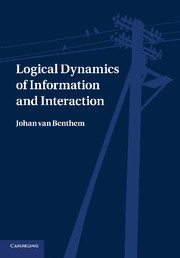Book contents
- Frontmatter
- Contents
- Preface
- Acknowledgments
- 1 Logical dynamics, agency, and intelligent interaction
- 2 Epistemic logic and semantic information
- 3 Dynamic logic of public observation
- 4 Multi-agent dynamic-epistemic logic
- 5 Dynamics of inference and awareness
- 6 Questions and issue management
- 7 Soft information, correction, and belief change
- 8 An encounter with probability
- 9 Preference statics and dynamics
- 10 Decisions, actions, and games
- 11 Processes over time
- 12 Epistemic group structure and collective agency
- 13 Logical dynamics in philosophy
- 14 Computation as conversation
- 15 Rational dynamics in game theory
- 16 Meeting cognitive realities
- 17 Conclusion
- References
- Index
16 - Meeting cognitive realities
Published online by Cambridge University Press: 07 October 2011
- Frontmatter
- Contents
- Preface
- Acknowledgments
- 1 Logical dynamics, agency, and intelligent interaction
- 2 Epistemic logic and semantic information
- 3 Dynamic logic of public observation
- 4 Multi-agent dynamic-epistemic logic
- 5 Dynamics of inference and awareness
- 6 Questions and issue management
- 7 Soft information, correction, and belief change
- 8 An encounter with probability
- 9 Preference statics and dynamics
- 10 Decisions, actions, and games
- 11 Processes over time
- 12 Epistemic group structure and collective agency
- 13 Logical dynamics in philosophy
- 14 Computation as conversation
- 15 Rational dynamics in game theory
- 16 Meeting cognitive realities
- 17 Conclusion
- References
- Index
Summary
The themes in this book paint a more realistic picture than traditional views of logic as a study of abstract consequence relations. Agency, information flow, and interaction seem close to human life, suggesting links between logical dynamics and empirical cognitive science. But how much of this is genuine? Our systems are still mathematical in nature, and they do not question the normative stance of logic toward inference: they rather extend it to observations, questions, and other informational acts. Still, many logicians today are intrigued and inspired by empirical facts about cognition: pure normativity may be grand, but it can be lonely, and even worse: boring. In this chapter, we therefore present a few thoughts on the interface of logical dynamics and cognitive science.
Self-imposed borders
Logic has two historical sources: argumentation in the dialectical tradition, and axiom-based proof patterns organizing scientific inquiry. Over the centuries, the discipline turned mathematical. Is logic still about human reasoning? Or is it, as Kant and Bolzano said, an abstraction in the realm of pure ideas? Then logical consequence is an eternal relationship between propositions, firmly cleansed of any stains, smells, or sounds that human inferences might have – and hence also of their colours, and tantalizing twists and kinks. Do empirical facts about human reasoning matter to logic, or should we just study proof patterns, and their armies called formal systems, in an eternal realm where the sun of Pure Reason never sets? Most logicians think the latter. Universities should just hire logicians: in Tennyson's words, ‘theirs not to reason why’. If pressed, philosophers might say that logic is normative; it describes correct reasoning. People would be wise to follow its advice – but so much the worse for them, if they do not. The butler Gabriel Betteredge said it all (Wilkie Collins, The Moonstone, 1868):
‘Facts?’ he repeated. ‘Take a drop more grog, Mr. Franklin, and you'll get over the weakness of believing in facts! Foul play, sir!’
- Type
- Chapter
- Information
- Logical Dynamics of Information and Interaction , pp. 330 - 341Publisher: Cambridge University PressPrint publication year: 2011



